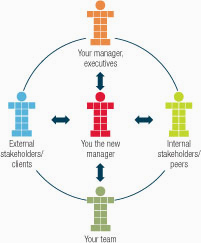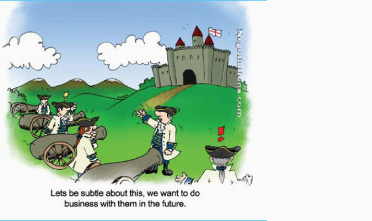As a manager, this often requires you to develop different kinds of relationships with people external to your immediate team.
All relationships take time to build, so it can be useful to consider relationship building as a task in its own right.
This chapter covers the following topics:
- relationships external to your team
- influencing others.
Relationships External to Your Team
There are likely to be a range of people, other work areas or organisations whose work directly impacts on yours, or whose work your team has a direct impact upon.
This includes people you have no direct authority over, though how well they perform or respond to your requests may have a huge impact on your team’s success.
Solid relationships here can reduce risks and lead to increased efficiency and better outcomes for the teams involved and for the organisation.
Figure 8. Building strategic relationships as a new manager
You may have developed relationships with these people before you became a manager. However, the nature of these relationships is now likely to be different, particularly in terms of:
- Playing a greater role in representing your team/division/organisation internally and externally, for example
- getting buy-in to your team’s work agenda from external stakeholders
- creating internal alliances with your peers
- using the authority of your role to resolve issues.
- Influencing others to ensure your team has the necessary resources(e.g. equipment, finance, people) to achieve its work goals
- Acting as a conduit for information to and from your team
- Managing the performance of your team (as discussed in Chapter 3).
Your relationship with your manager is likely to set the scene for much of you and your team’s success. Your manager acts as an important intermediary with the rest of the organisation. From day one it’s important to understand what your manager expects of you and how they can best support you in your new role.
“Opportunities multiply as they are seized.” – Sun Tzu
Suggested Activity
List all the people external to your team who have an impact on your team’s performance, or who your team has a direct impact on. Try to rank them in terms of relative importance, then rate the current strength of each relationship (e.g. ‘don’t know’, ‘poor’). Use this rating as a guide for setting priorities for building your strategic relationships.
As you communicate with different groups or individuals ask yourself:
- ‘What is my role?’
- ‘What skills do I bring to this discussion?’
- ‘What is my value to this group?’
- ‘At what level does this communication need to be pitched: operational or strategic?’
You should also think about the role of the other group members and what they bring to the discussion.
Suggested Activity
| How effective are you at building relationships | Circle one response for each statement | |||
| Strongly agree | Disagree | Agree | Strongly agree | |
| 1. I understand my manager’s responsibilities, key result areas, working style preferences and boundaries. | 1 | 2 | 3 | 4 |
| 2. I understand the pressures my team faces, the things that inspire them, and their working style preferences. | 1 | 2 | 3 | 4 |
| 3. I understand the culture, language, processes, interactions, and identity of my organisation. | 1 | 2 | 3 | 4 |
| 4. I share my vision with my team and peers. I regularly state my expectations around the business, goals, | 1 | 2 | 3 | 4 |
| 5. I am able to clearly differentiate my previous role from my new role (even if I am acting manager or have been promoted from within the group). | 1 | 2 | 3 | 4 |
| 6. I feedback information between my team, peers and stakeholders. | 1 | 2 | 3 | 4 |
| 7. I actively build my professional support network, including advisers from HR, training, finance and other internal support services. | 1 | 2 | 3 | 4 |
| Subtotals | ||||
| Total | ||||
| How did you score? | ||||
| 22-28 | Well done. You are confident at building relationships, which is an important management capability. Ensure you maintain the relationships and keep up the communication. | |||
| 15-21 | You are on the way. Perhaps you need more practice to gain confidence in building relationships with other groups or individuals. It is worthwhile talking to your manager or mentor for more support for you to build this important management capability. | |||
| 14 or less | You should consider making building relationships an urgent development priority. To be effective as a manager, you need both confidence and competence in building and maintaining relationships with others. Talk to your manager about development and support opportunities. | |||
Note: The quiz content has been adapted from Making the Transition to a New Managerial Role, Corporate Executive Board, 2008
Influencing Others
“One of the things I learnt when I was negotiating was that until I changed myself I could not change others.” – Nelson Mandela
One of the most important determinants of your effectiveness as a manager is your ability to influence others. You will typically need to influence others in the following broad contexts:
- convincing others to engage on a topic of importance to you
- encouraging people to appreciate your perspective
- influencing people to undertake particular actions.
We all have influencing skills. The question is whether those skills result in a high level of commitment from those we influence. Does the way we influence strengthen or weaken our relationships with those involved?
Some key points to keep in mind are:
- decide whether your overall approach needs to be one of consultation, collaboration or competition
- resist the temptation to rush towards a result – putting aside your agenda and listening to the interests of the other person is more likely to lead to a positive outcome, as well as strengthening the relationship.
For example, irrespective of various suggestions, a team member is always complaining about excessive workloads and cannot meet deadlines. By a manager probing more deeply and using skilful and relevant questioning techniques, a number of issues may be uncovered. The person complaining may in fact not have adequate skills to do the job.
However, they are very much motivated by the need to be seen as capable. The fear of being ‘uncovered’ is strong and will drive the person to cover up unless the negotiation starts from a ‘no fault’ premise and respectfully seeks to identify what is at the core of the problem.
Another possibility might be that, on deeper questioning, the team member is covering for a colleague. Their sense of collegiality is high and you as the manager need to work with that situation to help find a solution that addresses everyone’s interests.
Speaking and Listening
Effective communication is critical to influencing others.
When you want to influence someone or a group of people, you will probably only get one chance. So your communication needs to be compelling, the first time!
Here are some tips1:
- Think short – no more than 3 minutes first up is a good amount of time to start. You can give more information when asked, or after there’s been time for reflection
- If your topic is complex, try to relate your idea to something that people are already familiar with (could be a policy, product or service) to help orient your audience to your ideas
- Prepare and practice
- ‘Why’ comes before ‘What.’ People will understand better what you’re doing if they first know why you’re doing it
- Try to include a story or simple example. Use data sparingly, but effectively if it’s available
- Drawn from Derek Brookes, “Restorative Conversations”: Facilitator’s Guide (Relational Approaches, 2010): pp23-24.
Then – Listen for comments and questions.
We all have a sense of when someone is really listening to us. Likewise, we can easily spot when someone is ‘tuning out’ or waiting for us to finish so that they can talk. When this happens, we feel devalued and treated with disrespect; our motivation to continue talking dries up; and we even lose interest in what we are saying ourselves.
Real listening is not passive. Genuine listening involves actively demonstrating to the listener that you are listening. Some responses that show you are listening are physical (e.g. eye contact); others are verbal (e.g. summarising).
However, at an even deeper level, as a listener, you need to bring the right set of values and attitudes. There are a number of things you can say that will show the listener you are really listening. This is either because what you say reflects back to them what they have just been saying; or you say something that encourages them to continue with or clarify a line of thought.
One important point: it is not always helpful to say something in response. Allowing moments of silence gives a speaker the space to reflect, to feel and come up with the right words to say. Verbal signs of active listening include:
Encourage – them to continue – ‘Could you explain what happened next?’
Acknowledge – what they have said – ‘I understand,’ ‘I see’.
Check – that you understand – ‘You seem to be angry?’ ‘Am I right in thinking that you …?’
Clarify – what they have said – ‘Can you explain what happened when …?’
Reflect – back to them what they have said – ‘It sounds like you are …’
Recommended Further Reading and Resources
Relationships External to Your Workgroup
Introductory resources on topics including ‘running effective meetings’, ‘influence maps’, ‘stakeholder analysis’, and ‘win-win negotiation’ are available online, www.mindtools.com
Influencing Others and Negotiating
Fisher, R. & Ury, W. (1991), Getting to Yes: Negotiating Agreement without Giving In; Penguin, second edition.
Footnotes
- Drawn from Derek Brookes, “Restorative Conversations”: Facilitator’s Guide (Relational Approaches, 2010):
pp23-24.


